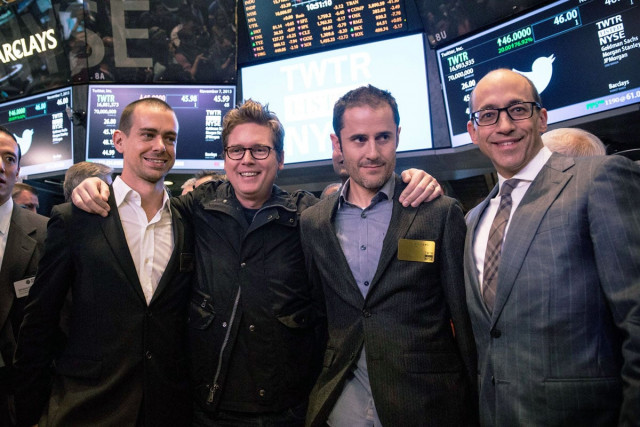Trading social media: Twitter hits Wall Street with a bang
Twitter was up 74 per cent at $45.27 from the initial public offering (IPO) price of $26 per share set on Wednesday.

(L-R) Twitter co-founder Jack Dorsey, Twitter co-founder Biz Stone, Twitter co-founder Evan Williams and Twitter CEO Dick Costolo pose for a photo after Twitter's IPO on the floor of the New York Stock Exchange (NYSE) on November 7, 2013 in New York City. PHOTO: AFP
The shares shot up by more than 90 per cent in early trade to as high as $50.00. At 1630 GMT, Twitter was still up 74 per cent at $45.27 from the initial public offering (IPO) price of $26 per share set on Wednesday.
While some analysts cautioned about the fast-changing nature of social media, the debut led to a stampede for Twitter, known for its one-to-many messages of up to 140 characters.
The key Twitter founders attended the opening on the New York Stock Exchange, along with "Star Trek" actor Patrick Stewart and a nine-year-old girl who operates a lemonade stand.
"Honored to join @ev @jack @biz @dickc & the @Twitter team at their historic IPO this morning," Stewart tweeted, referring to founders Evan Williams, Jack Dorsey, Biz Stone, and Twitter chief executive Dick Costolo.
"We have a lot of work ahead of us" Costolo told CNBC television from the floor of the stock exchange. "All the capital raised by this is going into the company."
Asked about Twitter's growth potential, Costolo said, "It's all about making it very simple and easy for new users to come to the platform... we all have examples of why this service can be useful to everyone on the planet."
Cantor Fitzgerald analyst Youssef Squali was upbeat on the company, saying in a note to clients that "Twitter is based on a one-to-all, all-the-time broadcast distribution model, and as such, fulfills an unmet need."
"This model is highly complementary to traditional media outlets (especially TV), and fulfills the need for up-to-the-minute, trending information in real time," the note said.
"The platform also benefits from positive network effects, with more activity on Twitter resulting in the creation and distribution of more content, which attracts more users, platform partners and advertisers, and so on."
Others sounded a note of caution, saying investor enthusiasm does not necessarily lead to a profitable company.
"There's always going to be investor mania, but it doesn't tell us anything about the future," said Larry Chiagouris, a professor of marketing at Pace University.
"The fundamental question is how much people have to say on Twitter. We know there are some people who are social and want to talk all the time, but you can't make a business model on those people."
Chiagouris added that "large corporations with hundreds of millions of dollars have not put substantial sums into paid media with Facebook and Twitter."
"They all are experimenting but nobody is putting 25 percent in social media. It may not sound cool but traditional media is still the media of choice today," he said.
Twitter offered 70 million shares on the New York Stock Exchange, generating $1.82 billion, and gave underwriters a 30-day option to purchase an additional 10.5 million shares.
The IPO assigned a market value of around $14.4 billion to the company whose messaging service has become a hugely popular tool for celebrities, journalists, political leaders and others.
With the over-allotment it should be the second-biggest tech IPO after Facebook's $16 billion effort last year and ahead of Google's 2004 offer, which raised $1.92 billion, according to research firm Dealogic.
Depending on the outcome of the common stock offer to underwriters, between 12.8 and 14.5 per cent of the company's shares will be publicly traded. The rest is held by its founders and a handful of early investors.
Twitter has fast become engrained in popular culture but must still convince investors of its business model, having lost more than $440 million since 2010.
But with 232 million users and growing, Twitter is expected to be able to reach profitability by delivering ads in the form of promoted tweets, and from its data analytics.
The research firm eMarketer estimates Twitter will bring in $582.8 million in global ad revenue this year, and nearly $1 billion in 2014.
Eden Zoller at the British-based consultancy Ovum said Twitter needs to show it is executing its business plan to reassure the market.
"Investors see social media and mobile as sweet spots and it is therefore no surprise that Twitter's IPO is creating so much excitement and is oversubscribed," she said in a research note.
"Twitter needs to step up and deliver on the expectations that are fueling its valuation, and show that it has what it takes to provide a sustainable business model."
In a speech Wednesday in New York, Mary Jo White, the head of the US Securities and Exchange Commission, expressed concern over the perhaps overzealous interest of investors -- lured by huge numbers of users of social media -- in tech stocks with uncertain profitability."



















COMMENTS
Comments are moderated and generally will be posted if they are on-topic and not abusive.
For more information, please see our Comments FAQ